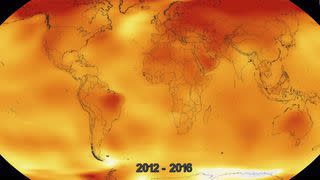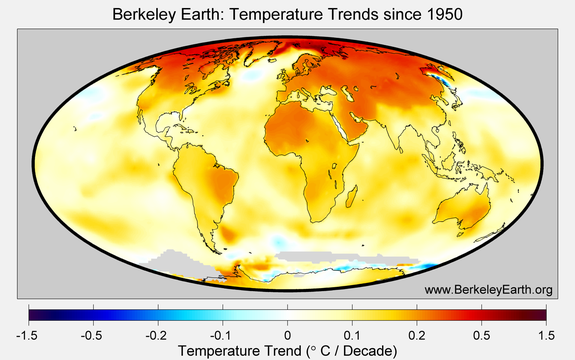EPA to actually hold 'red-team' climate debates, in a new level of 'head-in-the-sand bullshit'

In what many climate scientists see as a direct assault on the scientific process, the Trump administration is moving ahead with a plan to hold so-called "red team, blue team" climate science debates.
The plan, which was first reported by ClimateWire on Friday morning and then detailed by the New York Times, would involve government-appointed experts chosen with the help of Scott Pruitt, the head of the Environmental Protection Agency (EPA), and an outspoken climate denier.
In an indication of who the plan may be intended to favor, it was reportedly first unveiled to coal company executives at a meeting of the American Coalition for Clean Coal Electricity on Thursday.
SEE ALSO: Rick Perry denies the reality that CO2 is the main climate change driver, and here we go again
Pruitt, along with Energy Secretary Rick Perry, floated the idea for such debates before Congress and the media in recent weeks, saying such discussions would be modeled on processes used for evaluating military battle plans and ways that spacecraft engineers test critical systems or investigate accidents.
Details are sketchy — the EPA declined to respond to a request for comment — but such a debate would in general have a "red team" of experts who would challenge consensus findings from scientific reports, and a "blue team" would then have the opportunity to respond. How productive such an exercise would be would depend entirely on the details, such as the composition of the teams, the questions examined, and more.

Doubters of mainstream climate science, like Pruitt, say that dissenting views haven't been heard by the scientific community.
However, this proposal ignores the fact that science already has teams of people who critique findings and work to ensure accuracy, known as the peer review process. This process kicks in at multiple levels, whether it involves the publication of one study in a scientific journal or a major international climate assessment, such as the U.N. Intergovernmental Panel on Climate Change (IPCC).
Government policies based on scientific findings, such as EPA regulations, also go through their own form of peer review. What Pruitt appears to be doing, several climate scientists said, is to circumvent peer review and elevate discredited viewpoints.
Kate Marvel, a scientist at NASA's Goddard Institute for Space Studies in New York, said the red team, blue team idea is "silly," given the systems already in place within the scientific community and the government.
"Anyone who has ever tried to get a paper through peer review is well aware that there is plenty of challenge in climate science," she said. "It's one thing to respond to legitimate scientific criticism, quite another to refute unconstrained nonsense."
Notably, neither Pruitt nor Perry mentioned the National Academy of Sciences (NAS) when discussing the concept publicly. The NAS is the body typically tasked by Congress or the White House with evaluating scientific findings, and NAS reports have repeatedly found that human-caused climate change is both occurring and is a major threat to the United States and the world. The IPCC, itself, was formed in 1988 to be an international peer review of already peer-reviewed climate science findings, but critics say that dissenting voices are ignored or drowned out.
According to the more positive view of such an exercise, if it's conducted in a certain way, it could strengthen climate science by showing conservatives that the findings are solid, thereby convincing people like Pruitt to act. At least that's the rosy-colored view of such a move.
But given that the administration is in the process of ditching the Paris Agreement on Climate Change as well as EPA emissions limits on fossil fuel power plants, it's hard for most climate scientists to believe that take. Instead, they say, Pruitt may be trying to bring scientists funded by the fossil fuel industry into the EPA's decision-making process.
In other words, if you don't like the conclusions coming out of the scientific community, just rig the system to get conclusions you prefer.
It's not exactly popular within Pruitt's agency.
"This is a whole new level of climate-denying, head-in-the-sand bullshit," said one longtime EPA official, who asked to be granted anonymity because they were not authorized to talk to the press.
After all, the conclusions from the vast majority of climate science studies demand action, which the administration opposes.
Such conclusions include the volumes of evidence, from the sea floor to mountaintop glaciers, that human emissions of greenhouse gases are increasing global temperatures, melting polar ice caps, raising sea levels, and making some extreme weather events more common and severe.
Marshall Shepard, a meteorologist at the University of Georgia, said the planned debates are another example of how the administration is skirting processes already in place for scientific communication. "More special interest smoke and mirrors," he said.
The outcome of such red team, blue team debates could be used as evidence for changing certain federal policies at the EPA or elsewhere, perhaps even challenging the EPA's 2009 endangerment finding, which underpins its climate change regulations. That finding, prompted by a 2007 Supreme Court Case, found that carbon dioxide emissions threaten Americans' public health and welfare. If it were to be repealed, then the EPA may not need to regulate carbon emissions at all.
Michael Mann, director of the Earth System Science Center at Penn State University, said the administration is trying to invent its own form of peer review.

Image: Berkeley earth
"The system they describe is precisely what scientific peer-review is," Mann said in an email. "The reality is that the only thing these folks don’t like is the conclusion that the scientific community (that is, the world’s scientists, literally) has arrived at — that climate change is real, human-caused, and a threat."
"So they’re looking to use taxpayer funds to run a pro-fossil fuel industry disinformation campaign aimed at confusing the public and policy makers over what is potentially the greatest threat we face as a civilization."
Katharine Hayhoe, a climate researcher at Texas Tech University, said research shows "the single most effective message in changing people's minds on climate is the simple point that 'scientists agree.'"
"The multiple studies establishing the scientific consensus have been some of the most attacked and vilified in the history of climate science, right after the 'hockey stick record' studies. Why? Because they set the record straight," she said in an email.
She compared the red team/blue team idea for climate change to having debates about the link between smoking and cancer, in which half of the representatives were not cancer experts.
"This latest attempt to politicize the science — because make no mistake, it is the politicians who are politicizing the science — follows in this well-trodden and very successful pathway," she said.
"Introduce doubt, delay action."
